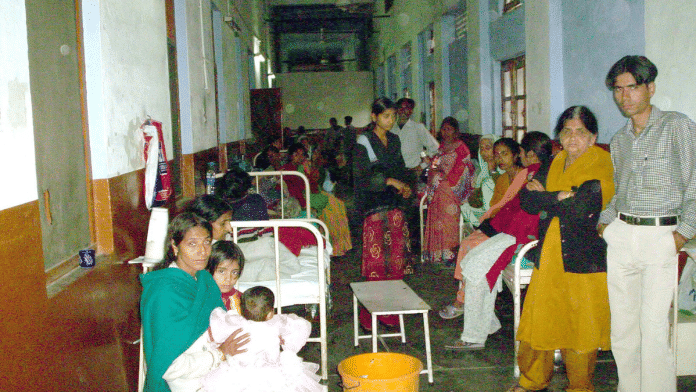Thank you dear subscribers, we are overwhelmed with your response.
Your Turn is a unique section from ThePrint featuring points of view from its subscribers. If you are a subscriber, have a point of view, please send it to us. If not, do subscribe here: https://theprint.in/subscribe/
It is a common perception that, after God, it is doctors whom we revere as divine, as they hold the extraordinary power to save lives and restore hope. That is the reason following medical ethics in healthcare is very important and in India it is guided under The Indian Medical Council (Professional Conduct, Etiquette and Ethics) Regulations, 2002 which speaks about the obligations of healthcare providers, including doctors, hospitals, and society as a whole, to prioritize the well-being of patients. Medical ethics consist of principles of respect for “autonomy, ensuring patients’ informed choices in their care; beneficence, focusing on patients’ health and welfare; non-maleficence, avoiding harm and negligence; and justice, ensuring fair and equitable treatment for all patients regardless of religion, nationality, race, or social status”.
Issues that surround the negligence of medical professionals require considerable considerations of both legal and ethical nature. Under Indian law, medical negligence is governed by the Constitution of India, 1950; Indian Medical Council (Professional Conduct, Etiquette and Ethics) Regulations, 2002; Drugs and Cosmetics Act, 1940; Clinical Establishment (Registration and Regulation) Act, 2010; The Consumer Protection Act, 2019; Bharatiya Nyaya Sanhita, 2023; and Bharatiya Nagarik Suraksha Sanhita, 2023. But proving negligence can be a tough nut to crack. The courts are in place to consider whether the healthcare providers acted out of accordance with accepted medical practices or whether their actions did not fall up to the reasonable standard of care. In the modern system of treating patients, the challenge lies in how some patients experience negligence or malpractice. For the protection of patient rights, many laws have been framed. This article aims to create awareness about these rights and empower patients to advocate for themselves effectively.
The Consumer Protection Act, of 2019, extends to cover patients as consumers. The idea is to recognize that such services are not privileges but rights to be provided in a manner that ensures accountability and transparency. The law in Indian Medical Association vs. V.P. Shantha, 1995, had made it clear that patients receiving services from doctors, hospitals, or clinics indeed fall under the protection of consumer law, especially if services are not provided free of charge. It has been provided under the Consumer Protection Act that patients can raise complaints and seek redressal against medical negligence, misdiagnosis, overcharging, or failure to get informed consent apart from other legal remedies. This law recognizes the right of patients to expect competent, ethical, and professional treatment, emphasizing how consumer rights serve as an important basis for the protection of dignity and security in health care.
Recently the Charter of Patient Rights prepared by NHRC (National Human Rights Commission), was published by the Ministry of Health and Family Welfare in June 2019 and last updated in August 2021, is a welcoming step taken by the Indian Government for the protection of the rights of patients without any specific, all-encompassing law. The charter describes 17 core rights and 6 responsibilities that are most important for the patients to maintain dignity, access quality healthcare services, and immunity against clinical negligence. Many important rights have been incorporated into this Charter. In addition to describing patients’ rights, the NHRC has, for the first time, outlined certain duties for patients toward the medical fraternity- an essential step to ensure the safety of doctors. The NHRC has emphasized that it is the responsibility of patients to:
- Provide accurate health-related information,
- Cooperate with doctors during examinations and treatment,
- Follow medical instructions,
- Pay hospital fees on time,
- Respect the dignity of doctors and hospital staff, and
- Refrain from any form of violence.
The Charter itself is not a statutory law, but it serves as a foundation for integration into health regulations and acts as a reference guide for clinical establishments, hospitals, and healthcare professionals regarding their responsibilities toward patient care. It promotes transparency, accountability, and a positive patient experience. Through this initiative, it is expected to increase the patient base and reduce instances of malpractice by fostering greater trust in healthcare services in India. The Charter of Patient Rights, published by the Ministry of Health and Family Welfare, has been referred to as the “medical constitution” for the public. That is why everyone must be aware of these rights and duties, as knowledge of our rights ensures their protection.
The NHRC has also introduced Internal Grievance Redressal Mechanisms under the Clinical Establishments (Registration and Regulation) Act, 2010, which is currently implemented in 10 states and six Union Territories. This mechanism aims to address issues at an internal level, ensuring that grievances are resolved promptly and effectively. If the internal mechanism fails to resolve a dispute, the matter can be referred to a higher authority as per the NHRC’s guidelines. But under no circumstances can this authority provide compensation.
Significant changes have been made in Consumer Protection Act, 2019, including revised compensation claim limits at the district, state, and national levels. Additionally, alternative dispute resolution mechanisms, in the form of mediation cells, have been introduced under the Act. The Consumer Protection (Mediation) Rules, 2020 explicitly exclude certain matters from the scope of mediation, particularly cases involving medical negligence that result in grievous hurt or death. Therefore, doctors must be aware that such cases cannot be referred to mediation and must follow the appropriate legal channels for resolution.
The slogan Jago Grahak Jago (“Awake Consumer, Awake”) encapsulates the importance of consumers being vigilant and informed. In healthcare, this vigilance is particularly crucial, as patients’ lives and well-being are at stake.
These pieces are being published as they have been received – they have not been edited/fact-checked by ThePrint.


